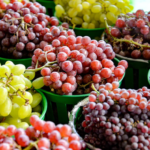Seedless table grapes lead the way in South Africa

Within five years, South Africa's table grape offering could look quite different than what the nation exports today.
Although no new varieties have taken a clear lead, plantations are undergoing a full transition to seedless varieties, said Leon de Kock of the Grape Alliance marketing team.
Several breeding programs, including Sheehan, ARRA and International Fruit Genetics, are driving the industry toward better, more market-appropriate varieties.
"It’s moving us into products that have a better shelf life and it's definitely moving us into a completely seedless part of the market, and grapes with a better flavor. Overall, there are better quality grapes from these new varieties. It's going to move South Africa more strongly into retail," de Kock told www.freshfruitportal.com.
Current development efforts should also bring balance to the South African industry, explained Johan van Niekerk, board chairman of the South African Table Grape Industry (SATI).
"We see almost no plantings of seeded grapes. But we see the balance between white, red and black seedless coming more to equilibrium. It won’t be long before South Africa has as much white seedless as red and black seedless," van Niekerk told www.freshfruitportal.com.
"It's the market that's moving that way. It’s becoming increasingly hard to sell seeded grapes. With the exception of the Middle East and Germany, I would say seeded grapes are falling out of fashion fast. We see that in the returns."
Van Niekerk estimated that in South Africa around 50 varieties are under development right now. While nothing has yet arisen as the next variety of promise, he said varieties are constantly under testing to find better planting options.
"It’s so difficult to say what will be best before something has proven itself. Everything new that is tested is evaluated by farmers trying to get varieties that are better in yield, better in eating quality, better in shelf life and most importantly, cheaper to produce," van Niekerk said.
"In a nutshell, more profitable varieties is what they are looking for. The cost of labor increased a lot in the last two years, so guys are trying to find varieties that need less labor to prepare."
Photo: www.shutterstock.com













































